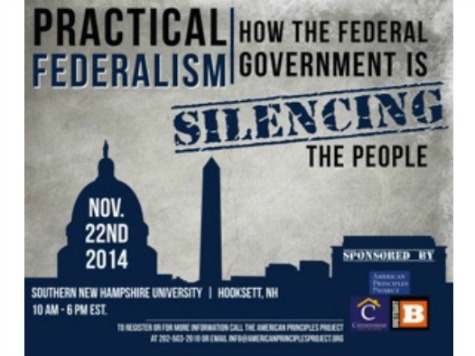Editor’s Note: Breitbart News Network, American Principles Project, and Cornerstone Action are co-sponsors of an upcoming forum centered on the principles of federalism. More information about the forum can be found at Cornerstone, American Principles Project, and Breitbart News.
Will children save the Tenth Amendment? Will federalism get its due in the next generation? Given what’s been happening in New Hampshire, one might think so.
The Tenth Amendment to the U.S. Constitution expresses the principle of federalism: “The powers not delegated to the United States by the Constitution, nor prohibited by it to the states, are reserved to the states respectively, or to the people.” The Tenth Amendment emphasized limiting the powers delegated to the federal government.
In New Hampshire’s last legislative session, no bill sparked more unexpected public engagement than HB 1508. It consisted of a simple statement: “Terminate all plans, programs, activities, and expenditures relative to the implementation of the common core state educational standards which have been adopted or may be adopted by the state board, including any assessments and instruction based upon such standards.”
In other words, get New Hampshire out of Common Core. The measure would have barred the state from imposing a federally driven program on local districts and students.
The bill failed, but not before two public hearings. A single hearing is usually enough for a New Hampshire bill, but in this case one was insufficient to accommodate the number of parents who came to support HB 1508. The assurance of so-called “Race to the Top” federal grants to states adopting Common Core standards was enough to win over a majority of legislators and public educators.
New Hampshire, however, won no money from Race to the Top, and parents weren’t so easily swayed. They want better standards for their children than those dictated in Common Core. Why agree to national educational standards, imposed at such a distance from locally accountable school boards?
Educational pros did their best to shame parents into backing down, refusing to believe that parents know what better standards look like. The state commissioner of education went so far at a hearing on HB 1508 to call proponents of the bill “[a] small [group], loud, and misinformed.”
HB 1508 failed, but not before stirring up a hornet’s nest that shows few signs of settling down. Common Core has proven to be the tipping point in New Hampshire. Citizens who haven’t been concerned about the Tenth Amendment have discovered what it means for the federal government to be entangled with parental decisions about appropriate educational settings for children.
Parents across the state testified in support of terminating Common Core in New Hampshire during the hearing on HB1508. Not one parent publicly testified in opposition.
A second, almost comical, federal intrusion into local schools has been in the news this year: federal requirements for school lunches. Apparently, the nutritional requirements being imposed from the Beltway aren’t sitting well with Granite State students. In Salem, the school district’s food service program lost $35,000 the first month of the 2014 school year, according to a report in the Salem Observer. Why? Non-participation by students.
How is this a federal issue? Schools that choose to take part in the federal lunch program get cash subsidies and foods from the U.S. Department of Agriculture for each meal they serve. In return, schools must serve lunches that meet federal requirements, which put an emphasis on whole-grain foods and smaller portion sizes. In Salem, as in other districts around the state, students and families are voting with their wallets by choosing not to buy the federally subsidized lunches.
Why would a local district sign on to a program that’s getting a thumbs-down from so many families? Free money. “Enumerated powers” and the Constitution fade into the background at the sound of the word “subsidy.” Only now is it becoming clear to the public how costly it is to abandon federalism by letting the federal government have an ever-increasing role in education.
The Tenth Amendment has never been repealed. This may be a moot point, as federal dollars have provided sufficient incentive to some state and local governments to cheerfully concede their rights to Washington. Where children are involved, however, parents are taking notice.
Federalism isn’t a remote or academic concept when a child’s homework is Common Core-aligned, yet confusing and academically inappropriate for the child. Federalism becomes relevant when a food service director sees federally subsidized food being thrown away. Where elected officials are slow to act and speak up, parents are taking the lead.
Will children save the Tenth Amendment? It’s concern for children that has galvanized New Hampshire parents into speaking out against federal overreach. Give the children credit for that.
Ann Marie Banfield is education liaison at Cornerstone Policy Research.

COMMENTS
Please let us know if you're having issues with commenting.